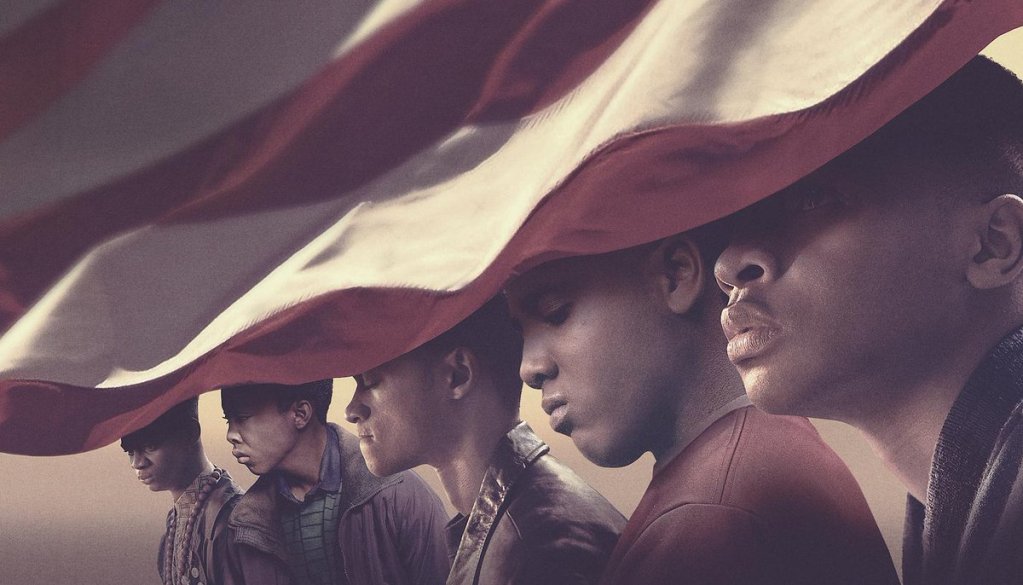Let emotion be your North Star
This episode follows the composer Kris Bowers’ personal story about composing the score for the culture-shifting and emotionally devastating work When They See Us. This award-winning series follows the true story of five boys, wrongfully accused in 1989 of the brutal rape of a jogger in New York’s Central Park. The narrative spans a quarter-century, from the night of the incident to their eventual exoneration as grown men. To tackle this project, Kris let emotion be his North Star. Allowing his emotions to guide him led him straight to the heart of the story — and inspired a score that connects the audience to the characters.

Transcript
Table of Contents:
- Chapter 1: My grandmother’s piano
- Chapter 2: My dream job
- Chapter 3: Watching the first episode
- Chapter 4: The job interview
- Chapter 5: Measure twice, cut once
- Chapter 6: Why I don’t start at the beginning
- Chapter 7: This isn’t working.
- Chapter 8: Just breathe
- Chapter 9: Writing the last cue
- Chapter 10: The premiere.
- Chapter 11: What the series means to me now
Transcript:
Let emotion be your North Star
Chapter 1: My grandmother’s piano

KRIS BOWERS: To me, the power of music is how quickly it can make you feel something.
My grandma had this brown upright piano. Old brown pianos always feel a little bit soulful and a little bit out of tune, so it definitely had that sound to it. And the keys felt like they were a little sticky and kind of clicked and clacked while you played it. My grandparents took me home from school pretty frequently when I was little, so I would do my homework at their house and then I would practice piano on their piano. It was in her living room, and it was one of those living rooms that you’re actually not really supposed to walk in, you can’t really go in very often. And she just allowed me in there because the piano was in there.
My grandma just loved music so much. Her aunt was an organist, and her aunt’s organ was in that room as well. My great-aunt passed when she was in her 90s. My grandma had this instrument that she felt badly that she couldn’t really play. This thing was just kind of sitting there. It just was a piece of furniture. So, she asked if I could play it.
When I’m playing piano, I’m really expressing deep aspects of my emotion to connect with people, be on the same emotional plane, for somebody else to listen to a piece of music that I’m playing on piano — to be able to understand how I’m feeling just by playing something for them. That organ, anytime I played it, it made it feel like the spirit of her aunt was kept alive.
JUNE COHEN: That’s composer Kris Bowers. And he’s about to tell us the story of scoring the 4-part series When They See Us.
This is Kris’ personal story about composing the score for a culture-shifting and emotionally devastating work. But there’s a takeaway for any creative: To find the heart of your work — and connect with your audience — let emotion be your North Star.
As Kris takes us through the process of composing When They See Us, you’ll hear the specific techniques he follows to realize the work. You’ll hear he and the director Ava DuVernay, work together to ensure the music takes the audience on an emotional journey in every scene. You’ll hear how he starts composing not at the beginning, but with the scenes that move him the most. You’ll also hear how Ava inspires Kris to stretch beyond his creative limits, and how they work together to identify the heart of a scene.
And here’s what you need to know about Kris Bowers and When They See Us. The award-winning series follows the true story of five boys, wrongfully accused in 1989 of the brutal rape of a jogger in New York’s Central Park. The narrative spans a quarter-century, from the night of the incident to their eventual exoneration as grown men. The series premiered on Netflix in 2019.
Kris Bowers is an Emmy-winning composer and pianist who has scored films and series, including Bridgerton, King Richard, Green Book and Inventing Anna. He first made a name for himself as a jazz pianist, winning the Kennedy Center’s Thelonious Monk International Piano Competition in 2011.
I’m your host June Cohen, and on this episode, you’ll hear original music composed for prepared piano. For visuals while you’re listening, go to sparkandfire.com
[THEME MUSIC]
Chapter 2: My dream job
What do you do when your hero wants a meeting? Don’t even look at your calendar. You’re available.
KRIS BOWERS: Ava DuVernay wanted to consider me as a choice for a composer. She’s one of the most prolific storytellers of our time and especially for the Black community, and so I had always dreamed of working with her. I even had demo’ed for a film of hers, it was a few years ago, for A Wrinkle in Time. And felt so frustrated because I was very far from being capable of being the composer for that project. She really reached out because Jason Moran recommended me. Jason had already been on the project for a couple of months and he had to go on tour. She asked if I would come in for a meeting. I just felt like — I’m just excited to meet this woman and I hope that I get to work with her, and I was like, “I don’t care what I’m doing. I’m available.”
I went over to her office, I sat down with her, and she actually said that she wasn’t so sure if I was the right choice. She knew that I worked on Green Book and felt like that was a very different project than When They See Us. I talked about how I felt about that and the response to that, especially in the Black community. After that conversation, she was like, “Would you mind coming back tonight and watching the first episode?” I was like, “Yeah, of course. I will be here.” I didn’t even look at my calendar. I was like, “Yep, I can be back, no problem.”
Chapter 3: Watching the first episode
KRIS BOWERS: Five very young boys were in Central Park on that same night. There was a white woman that was raped and brutally beat. The cops rounded up kids that they could find that were coming out of the park and arrested whatever kids they felt maybe would be good marks for putting this crime on. I got emotional pretty immediately. I was shocked at what I was seeing. I felt horrified for these kids. I felt scared for these kids. Actually even surprised myself that I started crying. For the parents — “one night I look away and this is what happens to my kids.” And their whole life has changed in this horrific way. I could see myself in these young boys. I remember my parents being so concerned about not only where I was, but how I was dressed, who I was with, and were so scared of me being seen as just a Black boy and what that could mean and wanting to protect me from that. I was the type of person that would be able to tap into that feeling.
Chapter 4: The job interview
KRIS BOWERS: I came back into her office and sat down and talked with her. She mentioned how it was so important to her that we felt the heart of these boys. If this was not scored correctly, it could feel like a procedural drama. A procedural drama has these rhythmic elements that feel, like, methodical or strategic. The feeling of these cops putting something together. It feels like pieces coming together. As these young boys are sitting here being interrogated and coerced, if we heard this type of music, the music would be scoring the perspective of the police. You might actually start to feel like these kids might be guilty.
I told her when I looked at that first episode, the genre that came to mind was horror. The way that these innocent young boys are being treated, there was something about that that felt horrific that I wanted to represent in the music. It’s like you’re watching a horror film and you feel like you are one of those people being chased. You’re so in the shoes of those main characters, you feel scared. The best way to approach it is like, try to find elements from those types of scores that can help us feel that sense of empathy with these kids. She was like, “Okay, thank you for coming in, and I’ll let you know.” A couple days later, they called me and told me that I actually had the job.
JUNE COHEN: Did you hear how — from his very first screening — Kris is already dialed in to the experience of the five boys? How they would feel. How their parents would feel. He uses this emotion as his North Star, letting it guide him on decisions — from the music genre on.
Chapter 5: Measure twice, cut once
How do you channel your best efforts quickly? Be really intentional. And make a playlist.
KRIS BOWERS: It was definitely a high-pressure situation. It was four months in total that I had to work on it, but I really want to take my time to be as intentional as possible. The phrase that comes to my mind is that carpenter phrase, like, “Measure twice, cut once.”
For each of the projects that I’m working on, I create a playlist of music that, for whatever reason, makes me think of that project. John Williams is always one of the first people I think of, just because I feel like he’s mastered emotional storytelling through music. Colin Stetson’s score from Hereditary was on there. He used saxophone in a way that I never heard before and just got so much range of emotion from that instrument.
And then there’s artists on the production side, like a lot of Kendrick Lamar’s producers; Trent Reznor and Atticus Ross, like, Nine Inch Nails. And then there’s a couple of Max Richter pieces on there, as well. These piano pieces that are simple but emotionally rich, pieces of music that might even be stylistically pretty far away from what I’m actually working on, but if they have a certain emotional quality to them and I’m like, “Oh yeah, that’s an idea that I can play with.” It’s almost like a mood board. There’s so many times where I feel stuck on a certain project and I just go back to the mood board of what I put together. Let me just go listen to that music and see what happens.
Chapter 6: Why I don’t start at the beginning
KRIS BOWERS: The first cue in a movie usually already has a clear and identifiable sound. There might even be themes that are heard that are really clear. When I’m working on a project, starting at the beginning of the movie, what I’m watching doesn’t even really give me very much of the feeling that I’m going to get in the show. I usually choose the scenes that speak to me most to start with, one of those really, really deep and emotional scenes, because, for me, it feels like that’s the heart of these characters or that’s the heart of a lot of the story we’re telling.
For this first episode, one was the chase scene in the beginning in the park. Cops that are chasing these kids, being treated like they weren’t even human. The first instruments that I immediately thought of were bucket drums, because of how crucial that was to the sound of New York in that time. I really wanted to convey what it felt like from these kids’ perspectives, frenetic energy, this chaos, the danger. When I played the police chase scene, I remember Ava saying, “Wow, that’s how we’re just going to start? We’re just going to start and come in and kill it? That’s how we’re going to start this project?” She was just like, “Wow, that’s exactly what this should be. This felt great. I guess this is how we’re going to roll.”
The other emotional moment that really spoke to me: the father-and-son moment where these police are telling Bobby that he needs to convince his son to take the deal and what they might do to him if Antron doesn’t. He comes back in to tell his son. Bobby just gets so upset, yells at him, and tells him that he’s going to do whatever the police tell him. The son’s heart is just so broken that his dad’s not hearing him. This system is applying this pressure where the dad is now being a villain to his own son. The piano melody felt like a combination of the heartbreak and then that eerie horror-sounding cello over the top of all of it to remind us of the complexity of the situation that they’re in. She was just like, “Wow, you’re just trying to make me cry? You’re just trying to make me cry on this first pass?”
I’m a musician. I can feel something from a piece of music because I’m understanding it on a technical level. I love playing it for other people that are not musicians. When they just feel something, they feel it. They can’t tell you that, “Oh, this chord and the way that that chord moved to this chord made me feel this feeling.” It’s like, no, did this go up or down? The up is making me feel hopeful and the down is making me feel, like, depressed. The biggest compliment to me from her was that I made her feel the way that she wanted to feel, and not that it was a good piece of music or she was impressed with it or any of that. It was more so that she was like, “Yep, that’s the feeling that I want to feel. You got it.” It wasn’t always the case, but the first two, I left a good impression, thankfully.
Chapter 7: This isn’t working.
KRIS BOWERS: When you have a conversation with Ava, it feels like you are the only person that exists. She’s so great at being so engaging, so captivating, and so present, while also recognizing that she has very high standards. I knew that if I sent it to her and it wasn’t right, she wasn’t just going to say yes because we had a time crunch. She definitely was going to keep pushing me to get it right. There is the sequence where we see the mom talking to young Antron and it cuts to him coming out of jail now as an adult, and he goes home and sees his father and they hug. When she watched it with the temp music before my music was in it, she would always cry at the moment that they hugged. The first time I put music in there, she wasn’t feeling like she wanted to cry.
There are times where directors might just say, “This isn’t working,” and then just leave it there, and that’s really difficult to deal with. They tell me, “The temp made me feel that way, so just copy the temp, essentially.” For me, the emotion is always the North Star, so I would just ask her more questions: “What are you not feeling emotionally? Or how can we investigate this to really understand where you’re not feeling it?” She was like, “Let’s analyze why the temp is making me feel that way.” There’s momentum that’s being built while this conversation’s happening. There’s momentum that’s being built while he’s coming out of jail, while he’s walking. And then they hug, and all of that drops away. She would always say, “I don’t want to be prescriptive, so take that and do whatever you will with it.” The thing I loved about working with her is that she has a great balance of being able to make it clear how high her standards are and how much she expects, but also, at the same time, encouraging you to know that you have the ability to deliver that.
JUNE COHEN: Did you notice how Ava and Kris seem to share a North Star? They both rely on emotion to make sure the piece is on track. But they also know: This doesn’t have to be an emotional process. You can be objective and methodical as you chart an emotional journey.
Chapter 8: Just breathe
KRIS BOWERS: Every time I worked on it, I would have these really visceral emotions, but outside of working on it, I felt like I was a bit numb. This project was really difficult to write music from a place that I feel like is speaking to that depth and not allowing that to impact or bleed into my personal life. The thing that’s been most helpful is actually a lot of conversations with my wife. A lot of our conversations are about our trauma or about our histories or about how we navigate things on a daily basis. It is incredibly helpful that my wife, Briana Henry, is also an actress. She would always talk to me about an acting class she took where she would have a heavy scene and if they were still in that emotion from that scene, that her teacher would tell her to breathe and look at something to just focus on where you are right now and bring yourself back to the present moment.
There are also times where I am in a specific headspace that it’s tough for me to get out of. When I go play piano, it’s almost like I’m taking the emotion out of my head and observing it a bit more. I’m trying to figure out how to represent it in music as opposed to be consumed by it. My wife often talks about how when I play piano, she always says that you can really feel my heart. It’s just such a medium of expression for me that it’s hard for me to stop playing. It allows me to get lost.
Chapter 9: Writing the last cue
KRIS BOWERS: By episode three and four, we were in a serious time crunch. We had maybe 10 days for episode four. One of the last cues I wrote, Corey, as you see he’s having all these hallucinations, imaginative conversations while he’s in jail. He thinks about this young girl who he was with the night he went to the park and never saw again, and he imagines what would’ve went different if he just went with her. They end up going to Coney Island when it’s completely empty and they just have a day together, and then he realizes his reality. I would watch that scene without any music and the feelings I felt were so palpable and so clear and so visceral that it made me bawl my eyes out. I don’t know, it feels like a Hail Mary kind of moment or a moment where I’m just like, “I’m just going to try to write something that makes me feel this way, and if I trust my instincts and my feelings, it would land.”
Anytime I added music to it, it would either detract from that or enhance it or distract from it or take too much attention if it’s not bold enough. It was really clear whether or not I was accompanying in the right way, and it’s all based on whether or not I feel exactly the way that this story is meant to make me feel.
The first pass on it was the one that ended up getting approved.
Chapter 10: The premiere.
KRIS BOWERS: Watching the first episode at the premiere in New York at the Apollo Theater surrounded by people that were not a part of it, and also don’t have a biased opinion, feels like a really honest reaction to what we’re watching. There’s the courtroom scene; the guilty verdict is delivered. This flood of emotions came out. Hearing people crying and people, like, screaming, “No!” really showed how invested they were with the story and these characters. In that moment, I just allowed myself to feel the pain and the immediate terror that that moment was for those families, feeling like this huge bomb has been dropped, the floor has been taken from under you, and that feeling of loss, feeling angry, and feeling like all these emotions that you would think I would feel while I was working on it that I didn’t feel at all.
Once we left the Apollo, we went to Lincoln Center for the after-party at this restaurant. I remember not wanting to talk to anybody. Everybody just being quiet. Everybody just was still coming down from watching that and not really wanting to talk and not really wanting to celebrate, wanting to be still and self-heal and repair yourself before functioning in the world.
When They See Us has been the most-watched series on Netflix in the US every day since it premiered on May 31 pic.twitter.com/jS8IXIh03g
— Netflix (@netflix) June 12, 2019
Chapter 11: What the series means to me now
KRIS BOWERS: When people watch When They See Us, it’s a journey, and I definitely want them to feel the range of the journey. I want them to feel connected to these boys, connected to these families. I want them to feel the warmth and love that these parents have for their kids and also to feel an awareness of how easy it is for things to be manipulated. Thankful that this was one of the stories that did rectify what the conviction was, but at the same time, that these men who were once sweet boys and these families are forever changed by it.
When I thought about being a film composer, while it would be exciting to be a part of some big blockbuster movie, like, that wasn’t really my dream. My dream was to work on projects that stuck with people and work on things that feel important. When it comes to projects that changed an aspect of who I am, When They See Us is at the top of that list.
JUNE COHEN: I want to thank Kris for sharing his story with us. And I want to thank each of you for listening. I hope you heard things in it you can bring into your own work.
It might be the way Kris starts composing not with the first scene, but with the ones that move him the most — the ones that take him right to the heart of the characters. Or maybe it was the way Ava warned him against making the show sound like a procedural crime drama, inspiring him to instead choose a genre that would truly put the audience in the shoes of the characters.
Or maybe it’s the way he and Ava both used emotion as their North Star when a scene just isn’t working — tuning and re-tuning the work until it hits the right emotional notes.
Or maybe it’s the final scene that sticks with you: the premiere of When They See Us, when Kris heard every heart in the audience break for the boys in the story. And, how afterwards, they used the silence to channel their grief.

